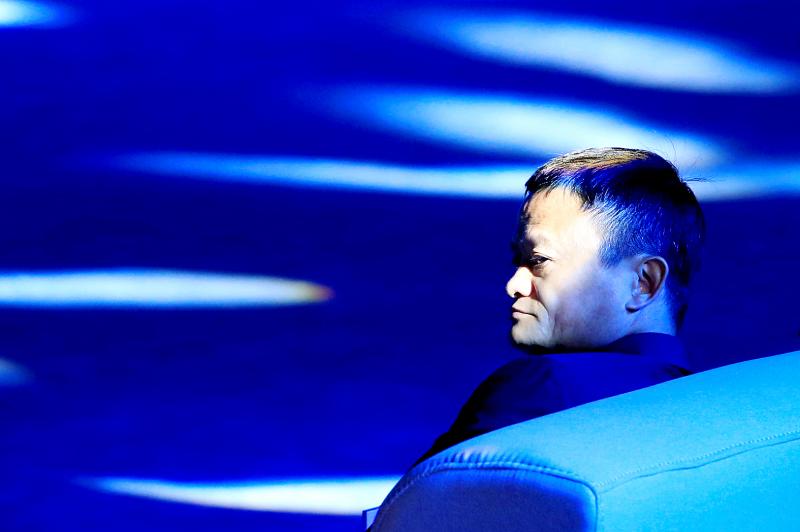Alibaba Group Holding Ltd (阿里巴巴) intends to raise as much as US$8 billion via a dollar bond sale as early as next week, matching its own Chinese record for a single issuance of offshore corporate debt, people familiar with the plans said.
The e-commerce giant aims to raise at least US$5 billion, but could wind up with more depending on reception, said the people, who asked not to be identified.
The deal is to be a multi-tranche offering, with specific tenors yet to be determined, they said.

Photo: Reuters
Alibaba tapped the global debt market in 2014 for the first time to raise US$8 billion — a record that still stands — shortly after its landmark New York stock debut.
It last came to the offshore market with a bumper US$7 billion bond deal in 2017, and needs to repay or refinance about US$1.5 billion of dollar debt, which comes due this year, Bloomberg data show.
The upcoming likely mega offering would test global investors’ appetite for the first time since Beijing launched an antitrust investigation into the company cofounded by billionaire Jack Ma (馬雲).
It also comes as its revenue grew at its slowest pace on record for a September quarter, underscoring how the company’s post-pandemic rebound is starting to plateau.
“We view the issuance as somewhat exploratory given the broader uncertainty around Ant/Jack Ma. It may well reveal how seriously global investors perceive the rapidly evolving regulatory environment in China,” Chuanyi Zhou (周川藝), a credit analyst at Lucror Analytics in Singapore, said yesterday.
Zhou was referring to Ant Group Co (螞蟻集團), the fintech firm cofounded by Ma that saw its planned US$35 billion initial public offering halted by Chinese regulators in November last year.
Alibaba declined to comment.
The company, which sat on a cash hoard of almost US$90 billion at the end of September, has in recent years spent billions acquiring stakes in promising start-ups, expanding its logistics network and cloud-hosting services, and building up an international business via Singapore-based online mall Lazada.
It is now engaged in a bruising battle with Meituan Dianping (美團點評) in food delivery, while fending off rivals like JD.com Inc (京東) and Tencent Holdings Ltd (騰訊) in businesses from groceries to retail.

Among the rows of vibrators, rubber torsos and leather harnesses at a Chinese sex toys exhibition in Shanghai this weekend, the beginnings of an artificial intelligence (AI)-driven shift in the industry quietly pulsed. China manufactures about 70 percent of the world’s sex toys, most of it the “hardware” on display at the fair — whether that be technicolor tentacled dildos or hyper-realistic personalized silicone dolls. Yet smart toys have been rising in popularity for some time. Many major European and US brands already offer tech-enhanced products that can enable long-distance love, monitor well-being and even bring people one step closer to

Malaysia’s leader yesterday announced plans to build a massive semiconductor design park, aiming to boost the Southeast Asian nation’s role in the global chip industry. A prominent player in the semiconductor industry for decades, Malaysia accounts for an estimated 13 percent of global back-end manufacturing, according to German tech giant Bosch. Now it wants to go beyond production and emerge as a chip design powerhouse too, Malaysian Prime Minister Anwar Ibrahim said. “I am pleased to announce the largest IC (integrated circuit) Design Park in Southeast Asia, that will house world-class anchor tenants and collaborate with global companies such as Arm [Holdings PLC],”

Sales in the retail, and food and beverage sectors last month continued to rise, increasing 0.7 percent and 13.6 percent respectively from a year earlier, setting record highs for the month of March, the Ministry of Economic Affairs said yesterday. Sales in the wholesale sector also grew last month by 4.6 annually, mainly due to the business opportunities for emerging applications related to artificial intelligence (AI) and high-performance computing technologies, the ministry said in a report. The ministry forecast that retail, and food and beverage sales this month would retain their growth momentum as the former would benefit from Tomb Sweeping Day

Thousands of parents in Singapore are furious after a Cordlife Group Ltd (康盛人生集團), a major operator of cord blood banks in Asia, irreparably damaged their children’s samples through improper handling, with some now pursuing legal action. The ongoing case, one of the worst to hit the largely untested industry, has renewed concerns over companies marketing themselves to anxious parents with mostly unproven assurances. This has implications across the region, given Cordlife’s operations in Hong Kong, Macau, Indonesia, the Philippines and India. The parents paid for years to have their infants’ cord blood stored, with the understanding that the stem cells they contained